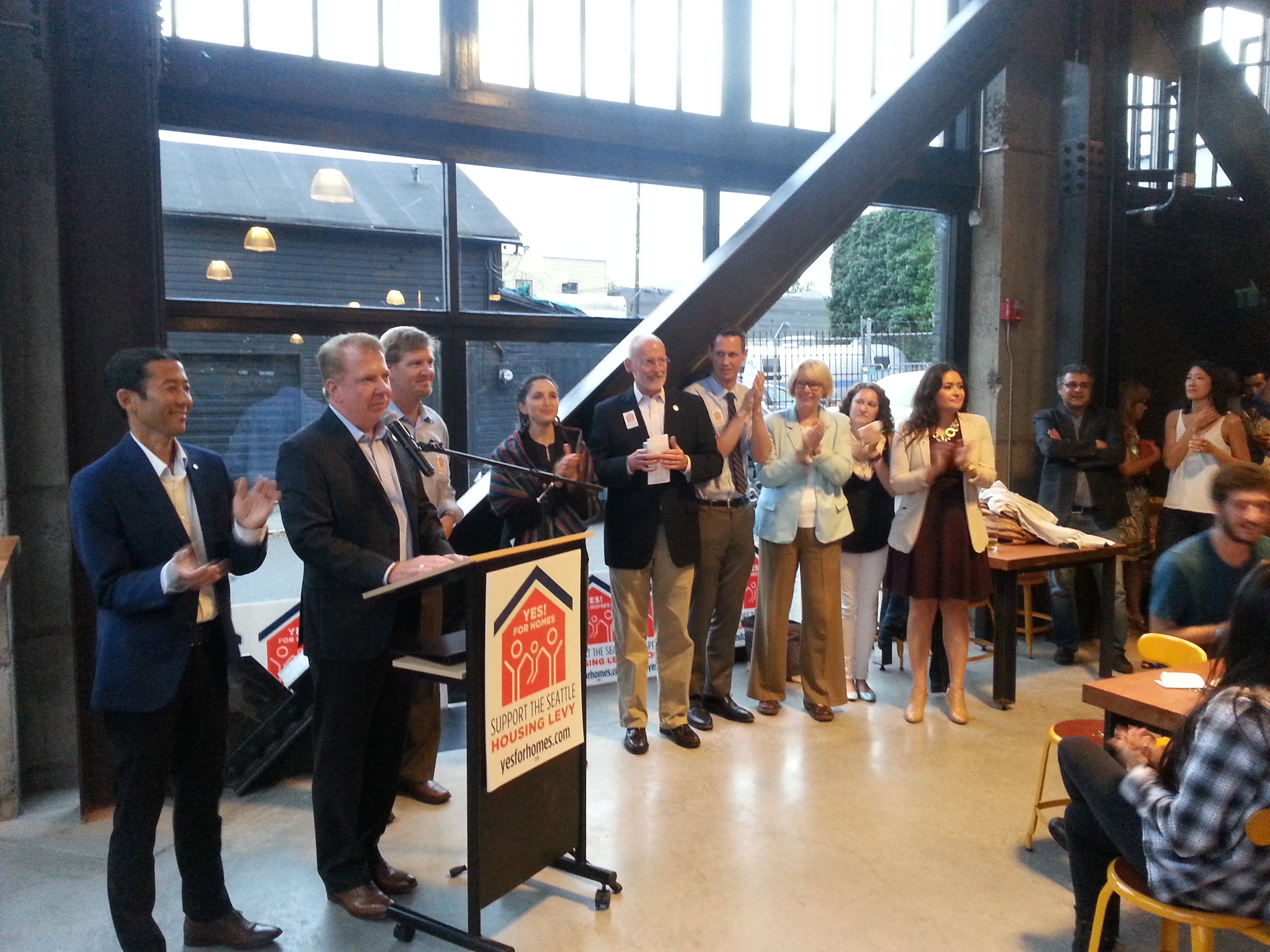Nicole Macri doesn’t blink during interviews. That’s not a figure of speech: her eyes bore into you like tiny, twin Bertha’s. “I’m feeling nervous but optimistic,” she said last night over the brisk wind on the sidewalk outside conveniently named Optimism Brewery. “I have just been astounded by the support that has come out for my campaign.”
Macri had been one of eight candidates vying for the open seat in the 43rd state legislative district, set to be vacated by Rep. Brady Walkinshaw in his bid for the congressional seat set to be vacated by retiring congressman Jim McDermott. Now, following yesterday’s primary election, she is one of two left standing for the November general election.
Macri has garnered endorsements ranging from outspoken activists like Real Change’s Tim Harris and Gender Justice League’s Danni Askini to a bevy of local mainstays that includes a supermajority of the Seattle City Council, the 43rd District Democrats, and Walkinshaw himself (not to mention his most formidable opponent, state Sen. Pramila Jayapal). The deputy director of the ultra-humanitarian Downtown Emergency Services Center, Macri has been the race’s left-leaning housing advocate. “My day job is pretty exhausting, and … this is exhausting in a different way,” she said. “It’s exhausting and energizing at the same time.”
Speaking of exhausting, try cramming into a cavernous beer hall with heavens knows how many hundreds of volunteers, candidates, staffers, reporters, supporters, lackies, politicos, and other souls all jabbering together. The aural effect is like hearing people speak in tongues. If Rousseau’s deified democracy has a voice, this is it: the voice of the Public, chatting over a pint of microbrew. About half the giant room was occupied by bronze-colored steampunky objects, giant barrels, pipes of all shapes and sizes. This is where Optimistic brews its putatively Panglossian beverages. The rest of the room was a swelling sea of bodies, many in coats and ties or elegant (for Seattle) gowns. Also, naturally, there was a bar.
The first results post at 8:15 p.m.. Macri took nearly half of the entire vote and almost double that of her closest competitor, good governance candidate Daniel Shih.
But the big news last night tonight was that the $290 million, seven year housing levy—the largest in the city’s history, according to the mayor’s office—passed in a landslide. Bar chart results from the county elections website are projected onto a screen in the back, the massive, horizontal, purple rod of the 68 percent Yes vote looming above the pint-sized bar belonging to the No vote. Passage of the housing levy means that affordable, subsidized housing projects like Capitol Hill Housing can expand their much-needed services, instead of going into emergency budgeting mode as they would have if the levy had failed. As we wrote when ballots for the election were first mailed:
Affordable housing and homeless service providers speak of the prospect of the levy failing in apocalyptic terms. “Don’t even go there,” said Marty Kooistra, director Housing Development Consortium, an association of nonprofit affordable housing developers and architects, when asked in a public meeting about the possibility of failure. Pradeepta Upadhyay is the executive director of InterIm Community Development Association (CDA), which runs Hirabayashi Place. Standing beside Murray yesterday, she called funding from the current housing levy “a key piece for financing and locating matching funds to build affordable homes, particularly for those below 60 percent of [AMI].”
Here’s how the money will be used:
Nine percent of the levy money will go to its administration, according to the city, while the bulk—more than $200,000 million—goes to “rental production and preservation” of 2,150 units for renters making no more than 60 percent AMI, and more than half to renters earning up to 30 percent. Seattle’s AMI was $89,600 last year, according to HUD. Another $42 million will go to maintenance and operations for 510 units affordable to renters making up to 30 percent AMI, and $20 million for two programs to help poor-ish homeowners and renters at risk of homelessness.
Proponents of the levy chuckled and congratulated one another as the results came in. Campaign manager Michael Maddux practically lept out of his chair when he saw the levy numbers. “I feel fantastic,” he said. “I think that this is a strong message from the voters of Seattle that we want inclusive communities and that means all income levels, all across the city.”
City councilmember Rob Johnson was beaming even more intensely than usual. He reflected on the importance of securing this funding source, then acknowledged that he and his colleagues still had another sixty-some Housing Affordability and Livability Agenda recommendations to implement. But even HALA isn’t the final step in addressing Seattle’s crisis of affordable housing, he said. “I think the biggest issue is the zoning change in the neighborhoods, and I think that’s going to be the big fight over the next year,” said Johnson, who is a former executive director of the Transportation Choices Coalition and an avowed urbanist. “We’re trying to be proactive about working with neighborhoods about what they want.”
After a few minutes for everyone to fan and pinch themselves, Mayor Ed Murray took to a mic in the corner of the room, flanked by his husband and much of the city council. “Five for five!” he called, referring to the fact that this is the fifth time voters have approved a new housing levy in the wake of federal defunding of housing assistance from the 1980s onward. The crowd hooted and hollared. He thanked the councilmembers, “who with me took a risk” by doubling the levy from its previous amount.
“Voters said today that we are not a divided city,” Murray said. As he held forth about unity, the rest of the room—which was hosting several campaign parties—gradually resumed its conversations. “This is a city that is dealing with homelessness by leaning in and listening to each other,” he saids, as the rumble of chitchat grew. Murray briefly pleaded with the folks in the back to just listen, just for a moment, and supporters loudly shushed them. But it became apparent that this was a lost cause and Murray, like many a speaker after him, resigned himself to marching through his prepared speech, delivered in a kind of iambic pentameter. He would list three pairs of things (“renters and homeowners, developers and neighbors,” etc.) and then commit them all to a positive verb (“came together”). Poor Steve Walker, director of the city’s Office of Housing, followed Murray, and the discomfort of watching him struggle against the all-consuming drone of cocktail chatter was palpable.
Later, back on the other side of the room, Macri rallied her supporters. She began to launch into a prepared speech that included the phrases “this journey started with a nudge” and “tonight is about all of us.” But when she ran into the same problems as Murray and Co—a big, loud room full of people who don’t care that you’re talking—she flustered about with her notes for a second, then tosses them aside and declared, “We … ran … a kickass campaign!
cjaywork@seattleweekly.com








